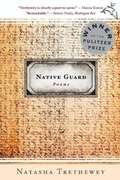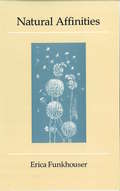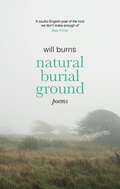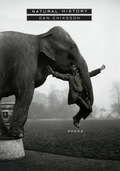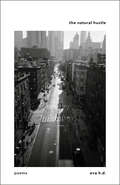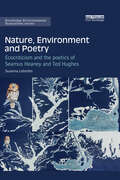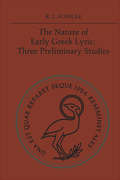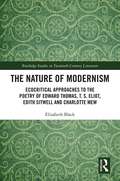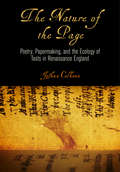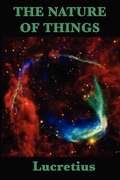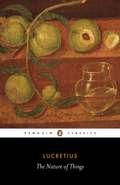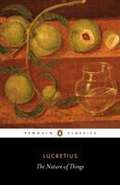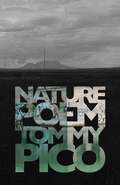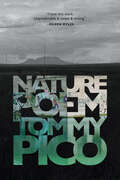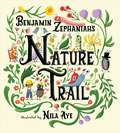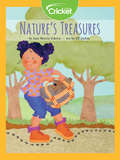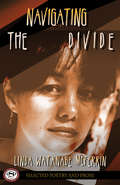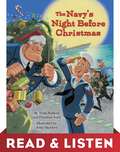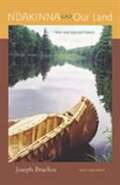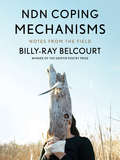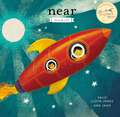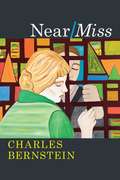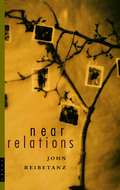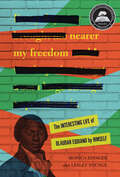- Table View
- List View
Native Guard: Poems
by Natasha TretheweyWinner of the 2007 Pulitzer Prize for Poetry Former U.S. Poet Laureate, Natasha Trethewey’s Native Guard is a deeply personal volume that brings together two legacies of the Deep South.Through elegaic verse that honors her mother and tells of her own fraught childhood, Natasha Trethewey confronts the racial legacy of her native Deep South—--where one of the first black regiments, The Louisiana Native Guards, was called into service during the Civil War.The title of the collection refers to the black regiment whose role in the Civil War has been largely overlooked by history. As a child in Gulfport, Mississippi, in the 1960s, Trethewey could gaze across the water to the fort on Ship Island where Confederate captives once were guarded by black soldiers serving the Union cause.The racial legacy of the South touched Trethewey’s life on a much more immediate level, too. Many of the poems in Native Guard pay loving tribute to her mother, whose marriage to a white man was illegal in her native Mississippi in the 1960s. Years after her mother’s tragic death, Trethewey reclaims her memory, just as she reclaims the voices of the black soldiers whose service has been all but forgotten.Trethewey's resonant and beguiling collection is a haunting conversation between personal experience and national history.
Natural Affinities
by Erica Funkhouser"Erica Funkhouser brings a new and inventive voice to contemporary American poetry.... Her vision, natural and honest, combined with the canny sophistication of a devoted poet, identifies the natural affinities that bridge the inner world of the imagination with the world of nature."--Ruth Whitman
Natural Burial Ground
by Will Burns'Will Burns is a soulful English poet of the kind we don't make enough of' Max PorterIn his beautiful, evocative new collection, Natural Burial Ground, Will Burns explores his deep interest in place and the natural world to excavate the emotional impact of grief and loss. Natural Burial Ground is by turns melancholy and musical, haunting and deeply empathetic, a collection that wrestles with the scope and heft of elegy, while retaining the poet's world-weary humour and range of imagery.There is throughout a sense of 'home' as unsettled, or unsettling - the landscapes of the Home Counties and of the Channel Islands - the very concept of islands themselves, becoming changed, haunted, in the wake of human experience.Time seeps into the soil of Natural Burial Ground. Reckoning with profound grief, and a country rife with 'Restrictions, recriminations . . .' - the poet finds the past visible everywhere on these grounds, where places come loaded with meaning across time - the deep past of archaeology, the weight of the personal-present, the reticent, uncertain future.In poems alive with familiar wildlife and the communities they move among - seabirds on the wing, the fishermen's daily catch - Natural Burial Ground speaks to our connections to landscapes, to family, the impact of climate change, pop music, wildlife and history.
Natural History
by Dan ChiassonDan Chiasson, hailed as "one of the most gifted poets of his generation" upon the appearance of his first book, takes inspiration for his stunning new collection from the Historia Naturalis of Pliny the Elder. "What happens next, you won't believe," Chiasson writes in "From the Life of Gorky," and it is fair warning. This collection suggests that a person is like a world, full of mysteries and wonders-and equally in need of an encyclopedia, a compendium of everything known. The long title sequence offers entries such as "The Sun" ("There is one mind in all of us, one soul, / who parches the soil in some nations / but in others hides perpetually behind a veil"), "The Elephant" ("How to explain my heroic courtesy?"), "The Pigeon" ("Once startled, you shall feel hours of weird sadness / afterwards"), and "Randall Jarrell" ("If language hurts you, make the damage real"). The mysteriously emotional individual poems coalesce as a group to suggest that our natural world is populated not just by fascinating creatures-who, in any case, are metaphors for the human as Chiasson considers them- but also by literature, by the ghosts of past poetries, by our personal ghosts. Toward the end of the sequence, one poem asks simply, "Which Species on Earth Is Saddest?" a question this book seems poised to answer. But Chiasson is not finally defeated by the sorrows and disappointments that maturity brings. Combining a classic, often heartbreaking musical line with a playful, fresh attack on the standard materials of poetry, he makes even our sadness beguiling and beautiful.From the Hardcover edition.
The Natural Hustle: Poems
by Eva H.D.An astonishing, inventive new collection of poems from the author of Rotten Perfect Mouth.Includes the poem &“Bonedog&” featured in the film I&’m Thinking of Ending ThingsDeeply attuned to the cadence of life, the poems in The Natural Hustle offer provocative, intimate snapshots. They explore the bewildering experience of living—precisely locating unexpected truths. Ingenious, original, surprising, here is a one-of-a-kind poetic voice.
Nature, Environment and Poetry: Ecocriticism and the poetics of Seamus Heaney and Ted Hughes (Routledge Environmental Humanities)
by Susanna LidströmThe environmental challenges facing humanity in the twenty-first century are not only acute and grave, they are also unprecedented in kind, complexity and scope. Nonetheless, or therefore, the political response to problems such as climate change, biodiversity loss and widespread pollution continues to fall short. To address these challenges it seems clear that we need new ways of thinking about the relationship between humans and nature, local and global, and past, present and future. One place to look for such new ideas is in poetry, designed to contain multiple levels of meaning at once, challenge the imagination, and evoke responses that are based on something more than scientific consensus and rationale. <P><P> This ecocritical book traces the environmental sensibilities of two Anglophone poets; Nobel Prize-winner Seamus Heaney (1939-2013), and British Poet Laureate Ted Hughes (1930-1998). Drawing on recent and multifarious developments in ecocritical theory, it examines how Hughes's and Heaney's respective poetics interact with late twentieth century developments in environmental thought, focusing in particular on ideas about ecology and environment in relation to religion, time, technology, colonialism, semiotics, and globalisation. <P><P> This book is aimed at students of literature and environment, the relationship between poetry and environmental humanities, and the poetry of Ted Hughes or Seamus Heaney
The Nature of Early Greek Lyric: Three Preliminary Studies
by Robert L. FowlerThree important literary questions in early Greek lyrics are addressed in this study. First, Fowler attempts to determine the extent that Homer and epic poetry generally influenced the lyric poets, with respect to both the style of compositions and their content. Identifying the certain examples of influence – which are far fewer than often thought – he analyses the technique of imitation, tracing a development from simpler to more complex as the archaic period proceeds. Throughout this and the following chapter, he often finds occasion to take issue with the famous and influential view of the early Greek mind championed by Bruno Snell and Hermann Fränkel. In the second chapter Fowler studies the organization of individual poems, identifying compositional principles that may be used to solve literary and textual problems. Some of these principles, like ring-composition, are old familiars; others are not. All are found to be more pervasive than is often realized, and reflect an attitude to composition rather different from the disorderly and associative techniques traditionally ascribed to the lyrics poets. The last chapter explores the nature of genres in the archaic period, starting from the vexed question of the definition of elegy. In all the genres associated with particular occasions, the author finds that the poets' professional skills and self-consciousness became more important than the purely occasional aspects of their composition. Observations of interest are made on, among others, citharodic songs, epigrams and epinician odes; and elegy in the end turns out, paradoxically, not to be a true genre at all.
The Nature of Modernism: Ecocritical Approaches to the Poetry of Edward Thomas, T. S. Eliot, Edith Sitwell and Charlotte Mew (Routledge Studies in Twentieth-Century Literature)
by Elizabeth BlackThis books presents the first extended study of the relationship between British modernist poetry and the environment. Challenging reductive associations of modernism as predominantly anthropocentric in character and urban in focus, the book’s central argument is that within British modernist poetry there is a clear and sustained interest in the natural world which has yet to receive adequate critical attention. Whilst modernist studies continues to emphasize the plurality of the movement and the breadth of voices and concerns within it, the environmental consciousness of modernist literature and its response to changes to human/nature relations following the experience of war and modernity remain largely unexamined. Exploring British modernist poetry from an ecocritical perspective offers a fresh approach to the movement and its context, and produces original readings of both canonical and more marginalized modernist voices. This book opens by discussing the relationship between modernism and ecocriticism and the benefits of creating a dialogue between the two. It then presents new readings of Edward Thomas, T. S. Eliot, Edith Sitwell, and Charlotte Mew that reveal a shared preoccupation with environmental issues and a common desire to find new ways of achieving physical, psychological, and artistic reconnection with nature. Building on the continuing growth of ecocriticism, this book demonstrates how green approaches to modernist studies can produce new insights into both individual poets and the modernist movement as a whole, making it an essential resource for students of modernism, ecocriticism, and early-twentieth-century literature.
The Nature of the Page: Poetry, Papermaking, and the Ecology of Texts in Renaissance England (Material Texts)
by Joshua CalhounIn The Nature of the Page, Joshua Calhoun tells the story of handmade paper in Renaissance England and beyond. For most of the history of printing, paper was made primarily from recycled rags, so this is a story about using old clothes to tell new stories, about plants used to make clothes, and about plants that frustrated papermakers' best attempts to replace scarce natural resources with abundant ones. Because plants, like humans, are susceptible to the ravages of time, it is also a story of corruption and the hope that we can preserve the things we love from decay.Combining environmental and bibliographical research with deft literary analysis, Calhoun reveals how much we have left to discover in familiar texts. He describes the transformation of plant material into a sheet of paper, details how ecological availability or scarcity influenced literary output in the sixteenth and seventeenth centuries, and examines the impact of the various colors and qualities of paper on early modern reading practices. Through a discussion of sizing—the mixture used to coat the surface of paper so that ink would not blot into its fibers—he reveals a surprising textual interaction between animals and readers. He shows how we might read an indistinct stain on the page of an early modern book to better understand the mixed media surfaces on which readers, writers, and printers recorded and revised history. Lastly, Calhoun considers how early modern writers imagined paper decay and how modern scholars grapple with biodeterioration today.Exploring the poetic interplay between human ideas and the plant, animal, and mineral forms through which they are mediated, The Nature of the Page prompts readers to reconsider the role of the natural world in everything from old books to new smartphones.
The Nature of Things
by LucretiusDe rerum natura (On the Nature of Things) is a 1st century BC didactic poem by the Roman poet and philosopher Lucretius with the goal of explaining Epicurean philosophy to a Roman audience. Lucretius presents the principles of atomism; the nature of the mind and soul; explanations of sensation and thought; the development of the world and its phenomena; and explains a variety of celestial and terrestrial phenomena. The universe described in the poem operates according to these physical principles, guided by fortuna, "chance," and not the divine intervention of the traditional Roman deities.
The Nature of Things
by LucretiusLucretius' poem On the Nature of Things combines a scientific and philosophical treatise with some of the greatest poetry ever written. With intense moral fervour he demonstrates to humanity that in death there is nothing to fear since the soul is mortal, and the world and everything in it is governed by the mechanical laws of nature and not by gods; and that by believing this men can live in peace of mind and happiness. He bases this on the atomic theory expounded by the Greek philosopher Epicurus, and continues with an examination of sensation, sex, cosmology, meteorology, and geology, all of these subjects made more attractive by the poetry with which he illustrates them.
The Nature of Things
by Stallings LucretiusLucretius' poem On the Nature of Things combines a scientific and philosophical treatise with some of the greatest poetry ever written. With intense moral fervour he demonstrates to humanity that in death there is nothing to fear since the soul is mortal, and the world and everything in it is governed by the mechanical laws of nature and not by gods; and that by believing this men can live in peace of mind and happiness. He bases this on the atomic theory expounded by the Greek philosopher Epicurus, and continues with an examination of sensation, sex, cosmology, meteorology, and geology, all of these subjects made more attractive by the poetry with which he illustrates them.
Nature Poem
by Tommy Pico<P>Nature Poem follows Teebs--a young, queer, American Indian (or NDN) poet--who can't bring himself to write a nature poem.<P> For the reservation-born, urban-dwelling hipster, the exercise feels stereotypical, reductive, and boring. He hates nature. He prefers city lights to the night sky.<P> He'd slap a tree across the face. <P>He'd rather write a mountain of hashtag punchlines about death and give head in a pizza-parlor bathroom; he'd rather write odes to Aretha Franklin and Hole.<P> While he's adamant--bratty, even--about his distaste for the word "natural," over the course of the book we see him confronting the assimilationist, historical, colonial-white ideas that collude NDN people with nature.<P> The closer his people were identified with the "natural world," he figures, the easier it was to mow them down like the underbrush. <P>But Teebs gradually learns how to interpret constellations through his own lens, along with human nature, sexuality, language, music, and Twitter. <P>Even while he reckons with manifest destiny and genocide and centuries of disenfranchisement, he learns how to have faith in his own voice.
Nature Poem
by Tommy PicoA book-length poem about how an American Indian writer can’t bring himself to write about nature, but is forced to reckon with colonial-white stereotypes, manifest destiny, and his own identity as an young, queer, urban-dwelling poet. A Best Book of the Year at BuzzFeed, Interview, and more. Nature Poem follows Teebs—a young, queer, American Indian (or NDN) poet—who can’t bring himself to write a nature poem. For the reservation-born, urban-dwelling hipster, the exercise feels stereotypical, reductive, and boring. He hates nature. He prefers city lights to the night sky. He’d slap a tree across the face. He’d rather write a mountain of hashtag punchlines about death and give head in a pizza-parlor bathroom; he’d rather write odes to Aretha Franklin and Hole. While he’s adamant—bratty, even—about his distaste for the word “natural,” over the course of the book we see him confronting the assimilationist, historical, colonial-white ideas that collude NDN people with nature. The closer his people were identified with the “natural world,” he figures, the easier it was to mow them down like the underbrush. But Teebs gradually learns how to interpret constellations through his own lens, along with human nature, sexuality, language, music, and Twitter. Even while he reckons with manifest destiny and genocide and centuries of disenfranchisement, he learns how to have faith in his own voice.
Nature Trail: A joyful rhyming celebration of the natural wonders on our doorstep
by Benjamin ZephaniahA joyful celebration of nature and the wonder of the world around us by legendary poet and performer Benjamin Zephaniah, one of The Times' top 50 British post-war writers.At the bottom of my garden, there's a hedgehog and a frog,And a lot of creepy-crawlies living underneath a log . . .All around us, from parks to gardens and flowerpots to pavements, there's a world of wonder just waiting to be discovered. Why not look a little closer and see what you find?This joyful celebration of nature reminds us all to take a closer look at the world around us, and enjoy the wonder of nature wherever we find it. Packed with animals and minibeasts galore, this imaginative rhyming text is perfect for reading aloud.
Nature's Treasures
by Jane Morris UdovicA young girl learns about the wonders of nature in this rhyming poem.
Navigating the Divide: Poetry & Prose (Legacy Series)
by Linda Watanabe McFerrinNavigating the Divide: Selected Poetry and Prose is a career-spanning, multi-genre collection from the award-winning Asian-American writer and indie lit legend Linda Watanabe McFerrin. In poetry and prose that is sometimes profoundly personal, sometimes astoundingly surreal, this world traveler and devoted literary explorer breaks down walls, bridges, cultures, and genres, delighting and instructing the reader. This rich, multi-faceted collection really does "navigate the divide" between spiritual and physical, between thought and desire, between identity and others.
The Navy's Night Before Christmas: Read & Listen Edition
by Christine Ford Trish HollandThis story, written for military families, is about a visit from &“the Santa of Sailors&” to those who can&’t be home for Christmas. &’Twas the night before Christmas, when way out to sea Not a creature was stirring to windward or lee. The sailors were nestled all snug in their racks Like orders of pancakes, so tight were the stacks. One Christmas Eve out at sea, some homesick sailors are paid a visit by Master Chief Claus, the Santa of Sailors. This lively and poignant tale was inspired by Clement C. Moore&’s classic yuletide poem.This Read & Listen edition contains audio narration.
Ndakinna -- Our Land: New and Selected Poems
by Joseph BruchacWritten over a period of twelve years and published in magazines and anthologies, these beautiful poems of place and Abenaki Indian heritage are addressed to the land, to the poet's two sons James and Jesse, to his wife Carol, and to himself.
NDN Coping Mechanisms: Notes from the Field
by Billy-Ray BelcourtIn his follow-up to This Wound is a World, Billy-Ray Belcourt’s Griffin Poetry Prize–winning collection, NDN Coping Mechanisms: Notes from the Field is a provocative, powerful, and genre-bending new work that uses the modes of accusation and interrogation. He aims an anthropological eye at the realities of everyday life to show how they house the violence that continues to reverberate from the long twentieth century. In a genre-bending constellation of poetry, photography, redaction, and poetics, Belcourt ultimately argues that if signifiers of Indigenous suffering are everywhere, so too is evidence of Indigenous peoples’ rogue possibility, their utopian drive.In NDN Coping Mechanisms: Notes from the Field, the poet takes on the political demands of queerness, mainstream portrayals of Indigenous life, love and its discontents, and the limits and uses of poetry as a vehicle for Indigenous liberation. In the process, Belcourt once again demonstrates his extraordinary craft, guile, and audacity, and the sheer dexterity of his imagination.
Near: Psalm 139
by Sally Lloyd-JonesFrom the author of the bestselling The Jesus Storybook Bible, Sally Lloyd-Jones, comes an uplifting new message for children. Inspired by Psalm 139—which begins, &“O Lord, you have searched me and you know me&”—the lyrical text reminds little ones that God is with them anywhere they go in God&’s wide world.God is my Father who made everything.And I am a little explorer of the wide world.He is near meAnd he protects me.He sees meAnd he knows me.He is strongAnd he looks after me. He is with me—always!An inspirational, Bible-based board book, Near:is written by Sally Lloyd-Jones, the bestselling author of The Jesus Storybook Biblepresents lyrical text inspired by Psalm 139delivers a reassuring message that calms kids&’ nerves, soothes their anxieties, and eases their fearsfeatures a soft padded format that is a perfect fit for little handsis a great gift for a new baby, First Communion, Christmas or birthdayThe board book offers a soft, padded format, a perfect fit for little hands.Look for additional inspirational children&’s picture books in the series inspired by The Jesus Storybook Bible:Loved: The Lord&’s PrayerFound: Psalm 23Near is another resource to invite children to experience God&’s Never Stopping, Never Giving Up, Unbreaking, Always and Forever Love.
Near/Miss
by Charles BernsteinPraised in recent years as a “calculating, improvisatory, essential poet” by Daisy Fried in the New York Times, and as “the foremost poet-critic of our time” by Craig Dworkin, Charles Bernstein is a leading voice in American poetry. Near/Miss, Bernstein’s first poetry collection in five years, is the apotheosis of his late style, thick with off-center rhythms, hilarious riffs, and verbal extravagance. This collection’s title highlights poetry’s ability to graze reality without killing it, and at the same time implies that the poems themselves are wounded by the grief of loss. The book opens with a rollicking satire of difficult poetry—proudly declaring itself “a totally inaccessible poem”—and moves on to the stuff of contrarian pop culture and political cynicism—full of malaprops, mondegreens, nonsequiturs, translations of translations, sardonically vandalized signs, and a hilarious yet sinister feed of blog comments. At the same time, political protest also rubs up against epic collage, through poems exploring the unexpected intimacies and continuities of “our united fates.” These poems engage with works by contemporary painters—including Amy Sillman, Rackstraw Downes, and Etel Adnan—and echo translations of poets ranging from Catullus and Virgil to Goethe, Cruz e Souza, and Kandinsky. Grounded in a politics of multiplicity and dissent, and replete with both sharp edges and subtle intimacies, Near/Miss is full of close encounters of every kind.
Near Relations: Poems
by John ReibetanzIn John Reibetanz’s tightly crafted new collection of poems, poetry and narrative are united with astonishing power and beauty. The collection first probes pivotal moments in the lives of his family, leading to a haunting prose memoir of the journey to his dying mother that recalls a “nomadic childhood” in flight from his mother’s withdrawal into illness, his adult secession from an America bent on war, then emigration to a more accommodating country. Following the same creative urge celebrated in his father-in-law’s cooking and the blues of Louis Armstrong, the poems then move into a world of intersecting fictional relations, unfolding an extraordinary range of characters. Their dilemmas are not solved but contained in luminous poems, at once spare and ample, whose clarity is born of precision. In these poem-stories of love, loss, and recovery, darkness often serves to intensify the light. Near Relations is the work of a poet compassionately engaged with the world, and one of our most accomplished lyric voices.
Nearer My Freedom: The Interesting Life of Olaudah Equiano by Himself
by Monica Edinger Lesley YoungeMillions of Africans were enslaved during the transatlantic slave trade, but few recorded their personal experiences. Olaudah Equiano's The Interesting Narrative of the Life of Olaudah Equiano is perhaps the most well known of the autobiographies that exist. Using this narrative as a primary source text, authors Monica Edinger and Lesley Younge share Equiano's life story in "found verse," supplemented with annotations to give readers historical context. This poetic approach provides interesting analysis and synthesis, helping readers to better understand the original text. Follow Equiano from his life in Africa as a child to his enslavement at a young age, his travels across the Atlantic Ocean and Mediterranean Sea, his liberation, and his life as a free man.
